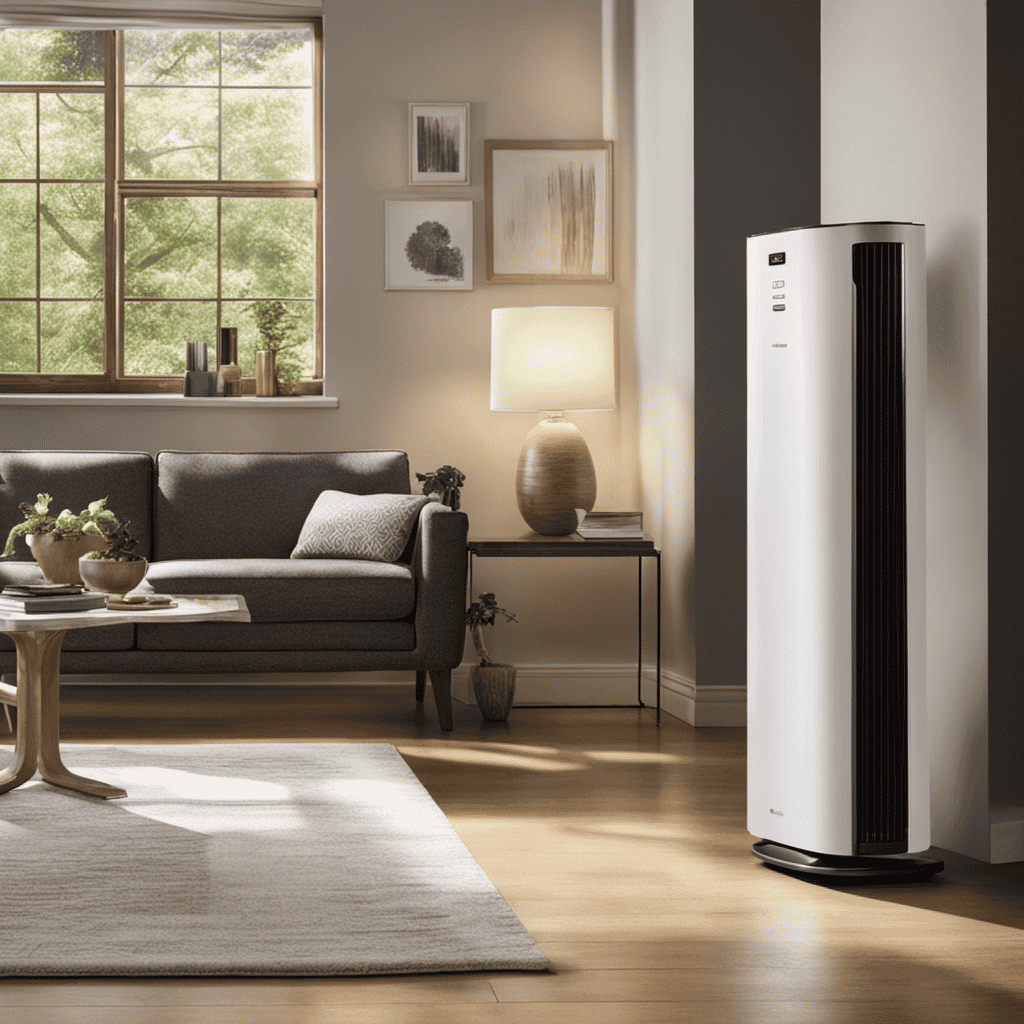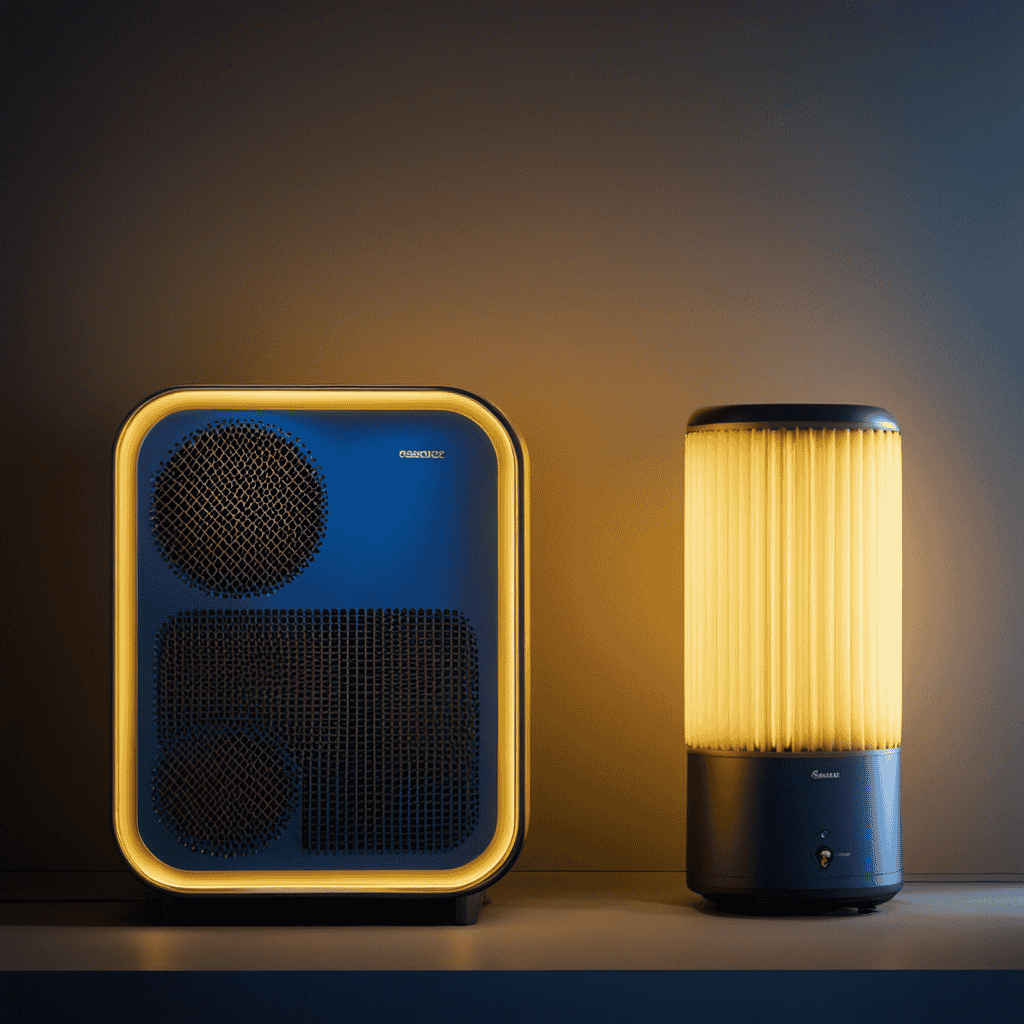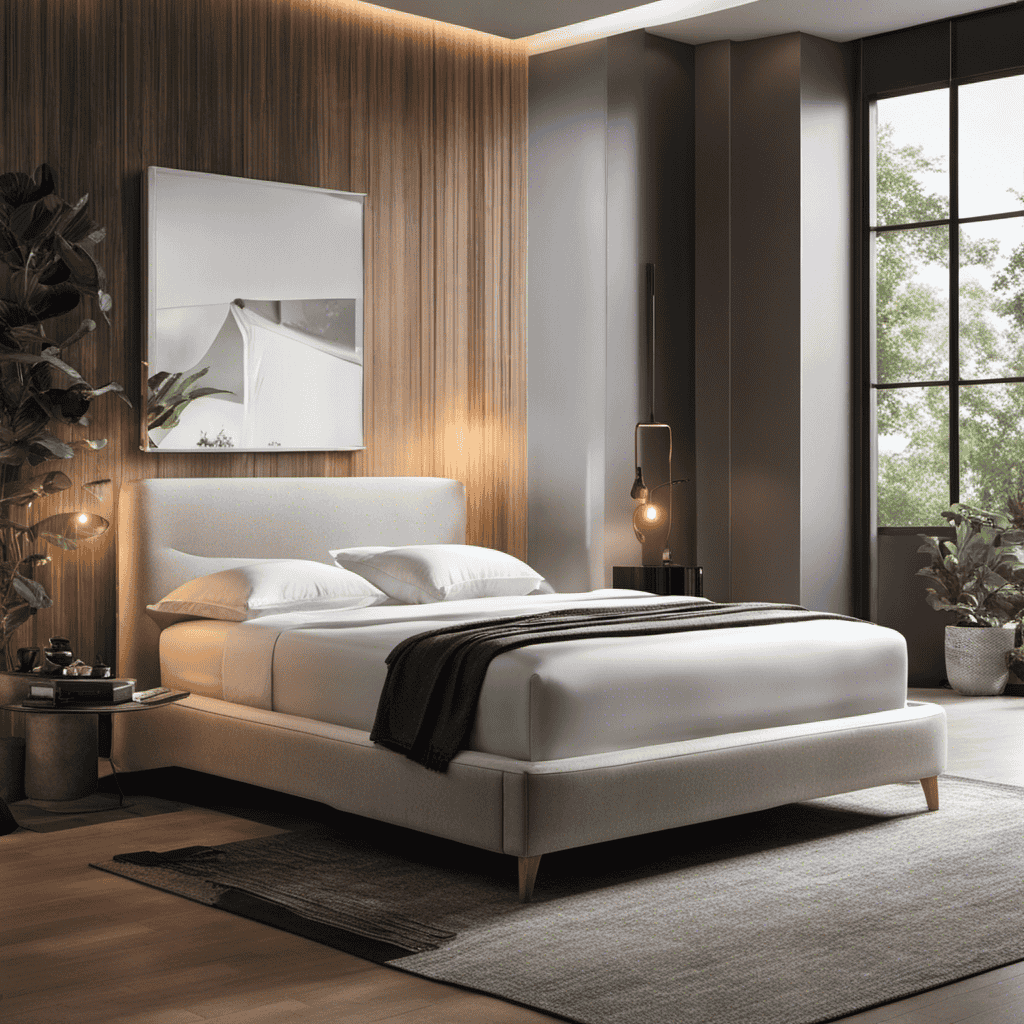As someone who prioritizes my health and the quality of the air I breathe, I frequently question the true cleanliness of the air inside my home.
That’s why I decided to dig deeper into the benefits of using an air purifier. What I discovered was eye-opening.
From reducing allergens and improving respiratory health to eliminating unpleasant odors, air purifiers play a crucial role in creating a healthier indoor environment.
Join me as we explore the reasons why we need air purifiers and the impact they can have on our well-being.
Key Takeaways
- Air purifiers improve overall air quality by removing harmful substances and pollutants.
- They reduce the risk of respiratory issues, allergies, and chronic diseases by removing dust, pollen, pet dander, mold spores, and VOCs.
- Poor air quality can have harmful effects on health, such as respiratory issues, cardiovascular problems, allergies, and impaired lung function.
- Investing in a high-quality air purifier can contribute to overall well-being by improving respiratory health, reducing allergies and asthma symptoms, and creating a healthier living environment.
Health Benefits of Using an Air Purifier
Using an air purifier can help improve the overall quality of the air you breathe. Indoor pollutants can have a significant impact on your health, and by using an air purifier, you can reduce your exposure to these harmful substances.
Studies have shown that air purifiers can effectively remove various indoor pollutants such as dust, pollen, pet dander, mold spores, and volatile organic compounds (VOCs) from the air. These pollutants can cause respiratory issues, allergies, and even contribute to the development of chronic diseases.
By improving the air quality in your home with an air purifier, you can reduce the risk of these health problems and create a healthier living environment.
Now, let’s explore the common indoor air pollutants and their effects on health.
Common Indoor Air Pollutants and Their Effects on Health
As an air quality expert, I will now discuss the harmful health effects of common indoor air pollutants and the effectiveness of air purification in reducing these risks.
Indoor air pollutants such as dust, pollen, pet dander, and volatile organic compounds (VOCs) can cause respiratory issues, allergies, and even contribute to the development of chronic diseases.
Research has shown that air purifiers equipped with HEPA filters and activated carbon can effectively remove these pollutants, providing cleaner air and reducing the risk of associated health problems.
Harmful Health Effects
You should be aware of the harmful health effects that poor air quality can have on you. Breathing in hazardous pollutants present in the air can lead to various health problems, especially when exposed to them for a long period of time. Here are some of the potential effects:
-
Respiratory issues: Long-term exposure to pollutants like particulate matter, volatile organic compounds (VOCs), and nitrogen dioxide can cause or worsen respiratory conditions such as asthma, bronchitis, and chronic obstructive pulmonary disease (COPD).
-
Cardiovascular problems: Fine particles in the air, such as PM2.5, can enter the bloodstream and increase the risk of heart attacks, strokes, and other cardiovascular diseases.
-
Allergies and sensitivities: Poor air quality can trigger allergies, exacerbate existing sensitivities, and cause symptoms like sneezing, coughing, and itchy eyes.
-
Reduced lung function: Prolonged exposure to pollutants can impair lung development in children and lead to decreased lung function in adults.
To safeguard your health, it is crucial to address poor air quality and take steps to minimize exposure to hazardous pollutants.
Effective Air Purification?
To effectively purify the air in your home, it’s important to choose a high-quality air purifier. Air purifier technology has advanced significantly in recent years, providing us with efficient and effective solutions for maintaining clean indoor air.
These devices work by removing harmful pollutants and allergens from the air, such as dust, pollen, pet dander, and even volatile organic compounds (VOCs). By utilizing filters, such as HEPA filters, air purifiers can capture particles as small as 0.3 microns in size, ensuring that the air you breathe is free from these contaminants.
The benefits of clean air are numerous, including improved respiratory health, reduced allergies and asthma symptoms, and a healthier living environment. Investing in a high-quality air purifier will not only provide you with cleaner air but also contribute to your overall well-being.
How Air Purifiers Can Improve Allergy Symptoms
Using an air purifier can help alleviate allergy symptoms by removing allergens from the air. I have personally experienced the benefits of using an air purifier in my home. Here are a few ways that air purifiers can improve allergy symptoms:
-
Reducing airborne allergens: Air purifiers are designed to capture and filter out allergens such as pollen, dust mites, and mold spores, which can trigger allergic reactions. This can significantly reduce exposure to these allergens and provide relief from symptoms.
-
Improving sleep quality: Allergies can disrupt sleep, leading to restless nights and fatigue. By removing allergens from the air, air purifiers can create a cleaner and healthier sleep environment, allowing for better sleep quality.
-
Removing pet dander: Pet dander is a common allergen that can cause allergic reactions in susceptible individuals. Air purifiers with HEPA filters can effectively capture and trap pet dander, reducing its presence in the air and minimizing allergic reactions.
-
Filtering out pollutants: Air purifiers can also help remove indoor air pollutants such as smoke, VOCs, and odors, creating a cleaner and fresher living environment.
The Link Between Poor Air Quality and Respiratory Issues
As someone who’s concerned about the impact of air quality on our health, I find it important to discuss the link between poor air quality and respiratory issues.
Studies have shown that exposure to pollutants in the air can lead to an increased prevalence of respiratory issues such as asthma, bronchitis, and allergies.
In this discussion, we will explore the impact of air quality on our respiratory health, the prevalence of respiratory issues in areas with poor air quality, and the effectiveness of air purifiers in improving air quality and reducing respiratory symptoms.
Air Quality Impact
The air quality in our homes can greatly affect our health and well-being. It is important to understand the impact of air pollution and the significance of air quality standards.
Here are some key points to consider:
-
Air pollution causes various health issues such as respiratory problems, allergies, and even cardiovascular diseases. The presence of pollutants like particulate matter, volatile organic compounds, and nitrogen dioxide can worsen these conditions.
-
Indoor air quality standards set guidelines for acceptable levels of pollutants in indoor spaces. These standards help ensure that the air we breathe is safe and healthy.
-
Poor air quality can lead to symptoms like coughing, sneezing, headaches, and fatigue. Long-term exposure to pollutants can have more serious consequences on our health.
-
Ventilation plays a crucial role in maintaining good air quality. Proper ventilation systems can help remove pollutants and improve indoor air quality.
Respiratory Issues Prevalence
In the previous subtopic, we discussed the impact of air quality on our health. Now, let’s delve into the prevalence of respiratory issues caused by poor air quality and the preventive measures we can take.
Respiratory issues, such as asthma, allergies, and chronic obstructive pulmonary disease (COPD), are increasingly common due to the presence of pollutants in the air we breathe. According to prevalence data, respiratory diseases affect a significant portion of the population worldwide. For instance, in the United States alone, approximately 25 million people suffer from asthma, while over 16 million have been diagnosed with COPD.
To combat these respiratory issues, preventive measures are crucial. Apart from practicing good hygiene and avoiding exposure to known allergens and irritants, using air purifiers can help alleviate the symptoms of respiratory problems. Air purifiers effectively filter out harmful particles, such as dust, pollen, and pet dander, improving indoor air quality and reducing the risk of respiratory issues.
Now, let’s explore the effectiveness of air purifiers in the subsequent section.
Air Purifier Effectiveness?
Using air purifiers can be an effective way to improve indoor air quality and reduce the risk of respiratory issues caused by pollutants.
Air purifiers work by filtering out harmful particles, such as dust, pollen, and pet dander, that can trigger allergies and asthma symptoms.
Regular maintenance of air purifiers is important to ensure their optimal performance. This includes cleaning or replacing filters, checking the fan and motor, and keeping the unit free from dust and debris.
The cost of air purifiers varies depending on the model and features, with prices ranging from $50 to several hundred dollars.
Investing in a high-quality air purifier can provide long-term benefits for your respiratory health and overall well-being.
Now, let’s explore the role of air purifiers in reducing asthma triggers.
The Role of Air Purifiers in Reducing Asthma Triggers
Air purifiers can significantly decrease asthma triggers. These devices are designed to filter out particles and pollutants from the air, including pet dander and cigarette smoke, which are common triggers for asthma attacks.
Studies have shown that using air purifiers in homes with pets can reduce the levels of pet allergens in the air, helping to alleviate symptoms in individuals with asthma.
Similarly, air purifiers are effective in removing harmful chemicals and particles present in cigarette smoke. The filters in air purifiers are designed to capture and trap these pollutants, preventing them from circulating in the air and being inhaled.
Air Purifiers and Their Impact on Indoor Odor Control
To control indoor odors more effectively, you can rely on the impact of air purifiers. These devices offer a range of benefits that can significantly improve indoor air quality. Here are some key points to consider:
-
Elimination of odors: Air purifiers utilize advanced filtration systems to capture and remove odor-causing particles from the air, such as smoke, pet dander, and cooking smells.
-
Reduction of harmful gases: Certain air purifiers are designed to target volatile organic compounds (VOCs) and other gases that can contribute to indoor odors and negatively affect health.
-
Fresh and clean environment: By continuously circulating and filtering the air, air purifiers help maintain a fresh and clean indoor environment, reducing the presence of unpleasant odors.
-
Improved respiratory health: A high-quality air purifier can remove allergens and irritants from the air, reducing the risk of respiratory issues and improving overall well-being.
Considering these benefits, it is essential to choose the right air purifier for your home to ensure maximum effectiveness in eliminating indoor odors and improving indoor air quality.
Choosing the Right Air Purifier for Your Home
When selecting an air purifier for your home, it’s important to consider factors such as room size, filtration technology, and maintenance requirements.
Air purifier maintenance is crucial for ensuring its optimal performance and longevity. Regularly cleaning or replacing the filters, as per the manufacturer’s instructions, is essential to keep the air purifier working effectively. Additionally, some models may require periodic maintenance, such as cleaning the internal components or replacing the UV-C bulbs.
As for the benefits of air purifiers for pets, they can help improve indoor air quality by reducing allergens, pet dander, and odors. This is especially beneficial for individuals with allergies or asthma. Air purifiers with HEPA filters can effectively capture and trap pet allergens, providing a cleaner and healthier environment for both humans and pets.
Frequently Asked Questions
How Much Does an Air Purifier Cost?
An air purifier costs can vary depending on the type and features. However, the benefits of having an air purifier, such as improved air quality and reduced allergens, justify the investment.
Can Air Purifiers Remove Viruses and Bacteria From the Air?
Yes, air purifiers can effectively remove viruses and bacteria from the air. They are beneficial in healthcare settings as they help reduce the spread of airborne pollutants, promoting a healthier environment.
Are There Any Downsides to Using an Air Purifier?
There are some downsides to using an air purifier. While they can help improve indoor air quality, they may produce ozone as a byproduct, which can be harmful to our health.
Can Air Purifiers Help With Pet Allergies?
Yes, air purifiers can help with pet allergies. They remove pet dander and other allergens from the air, reducing symptoms like sneezing and itching. This can also benefit those with asthma and seasonal allergies.
How Often Should the Filters in an Air Purifier Be Replaced?
The frequency of filter replacement in an air purifier is an important aspect of maintenance. Regularly replacing filters ensures optimal performance and effective removal of pollutants, contributing to cleaner and healthier indoor air.
Conclusion
In conclusion, it is evident that air purifiers play a crucial role in maintaining good indoor air quality and ensuring our well-being. By eliminating common indoor pollutants and allergens, these devices greatly improve respiratory health and reduce the risk of asthma triggers.
Moreover, they effectively control unpleasant odors, creating a fresh and pleasant environment. So, why wait? Invest in an air purifier today and breathe easy, because as the saying goes, ‘Clean air is a breath of fresh air.’










